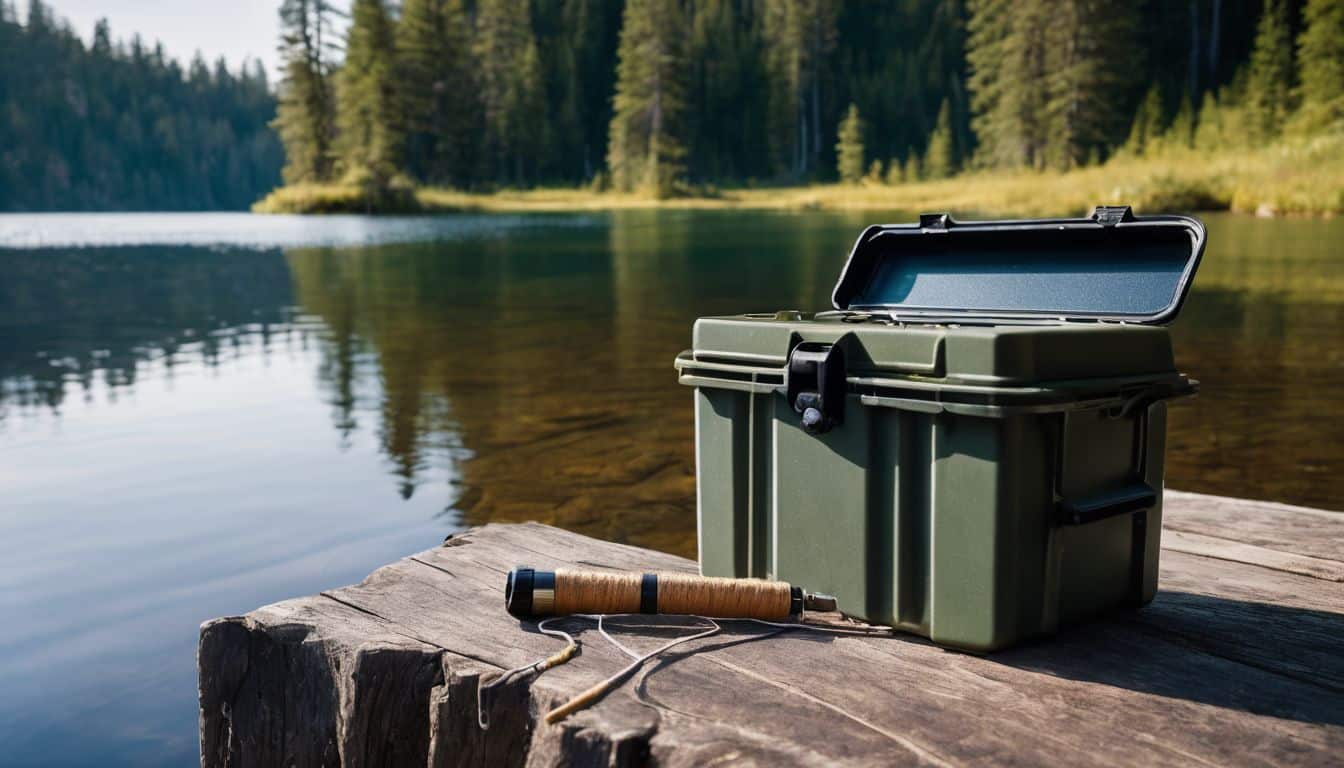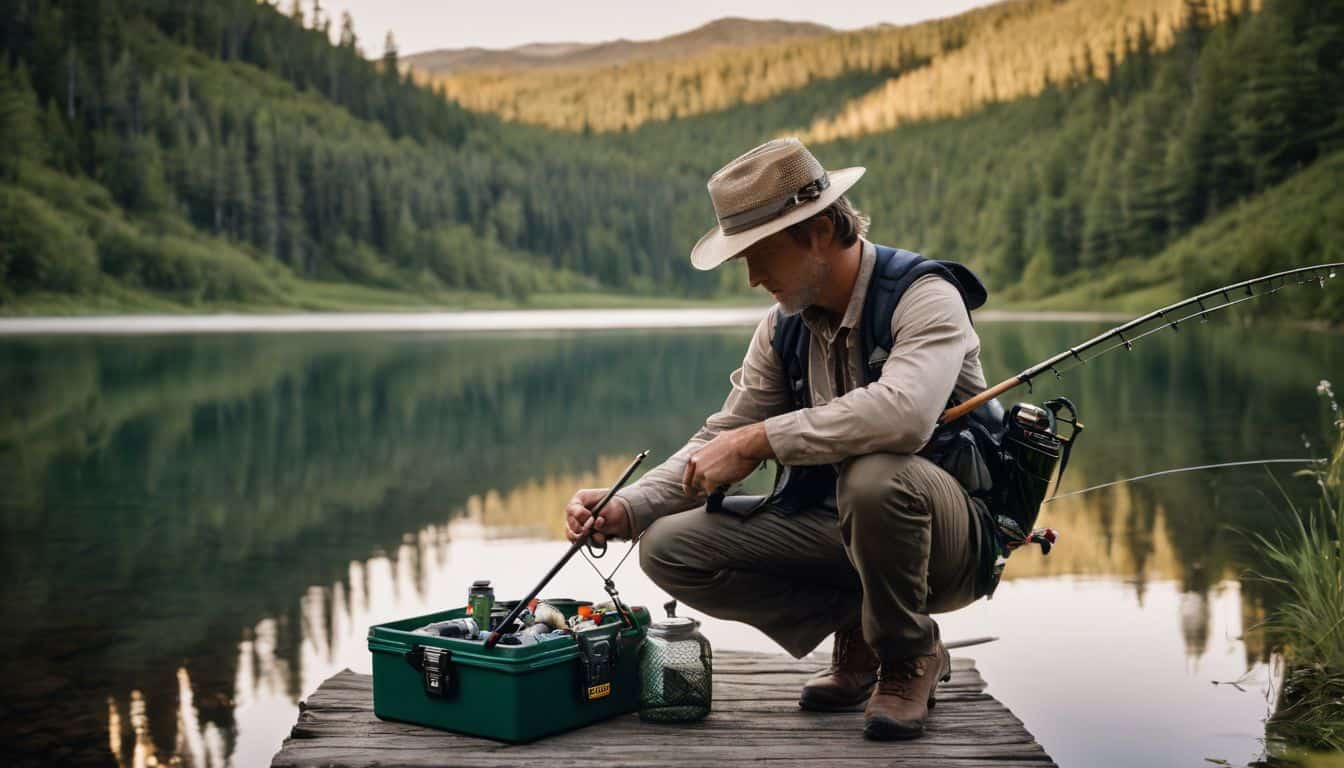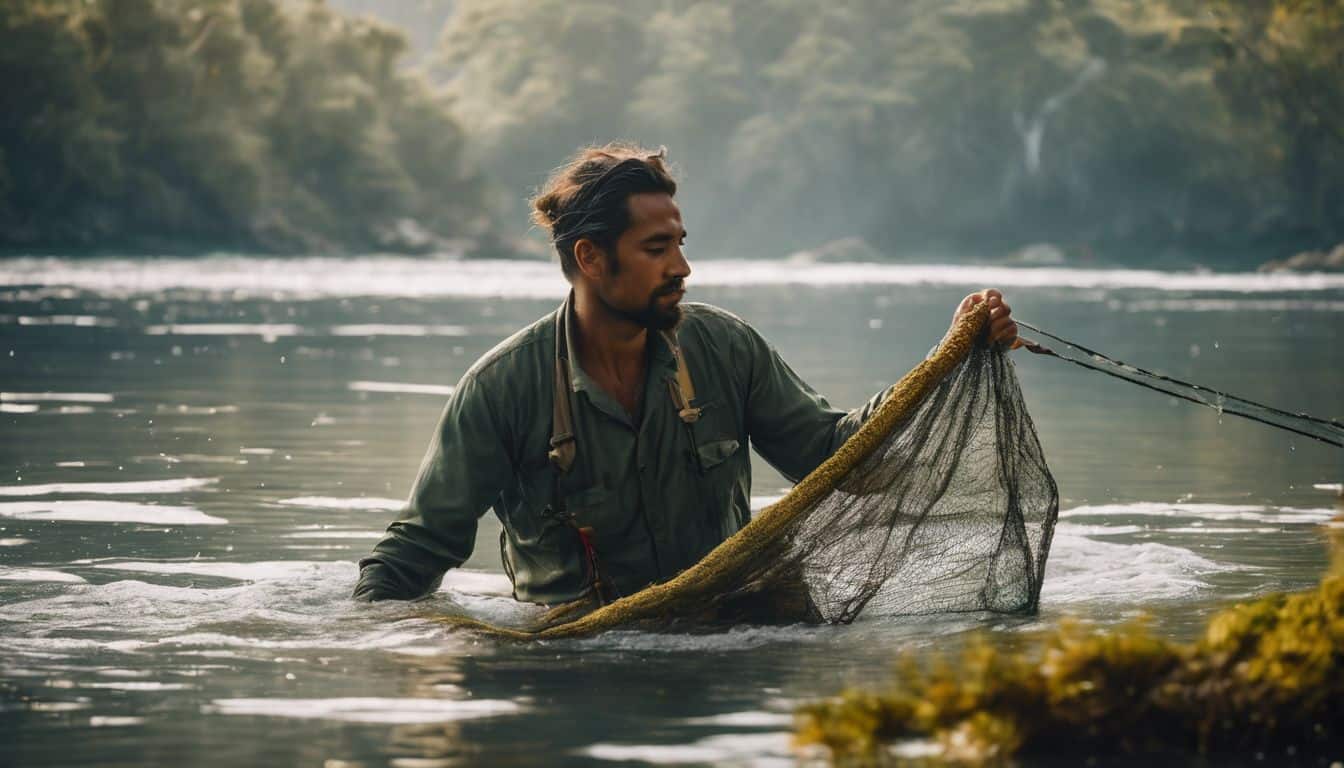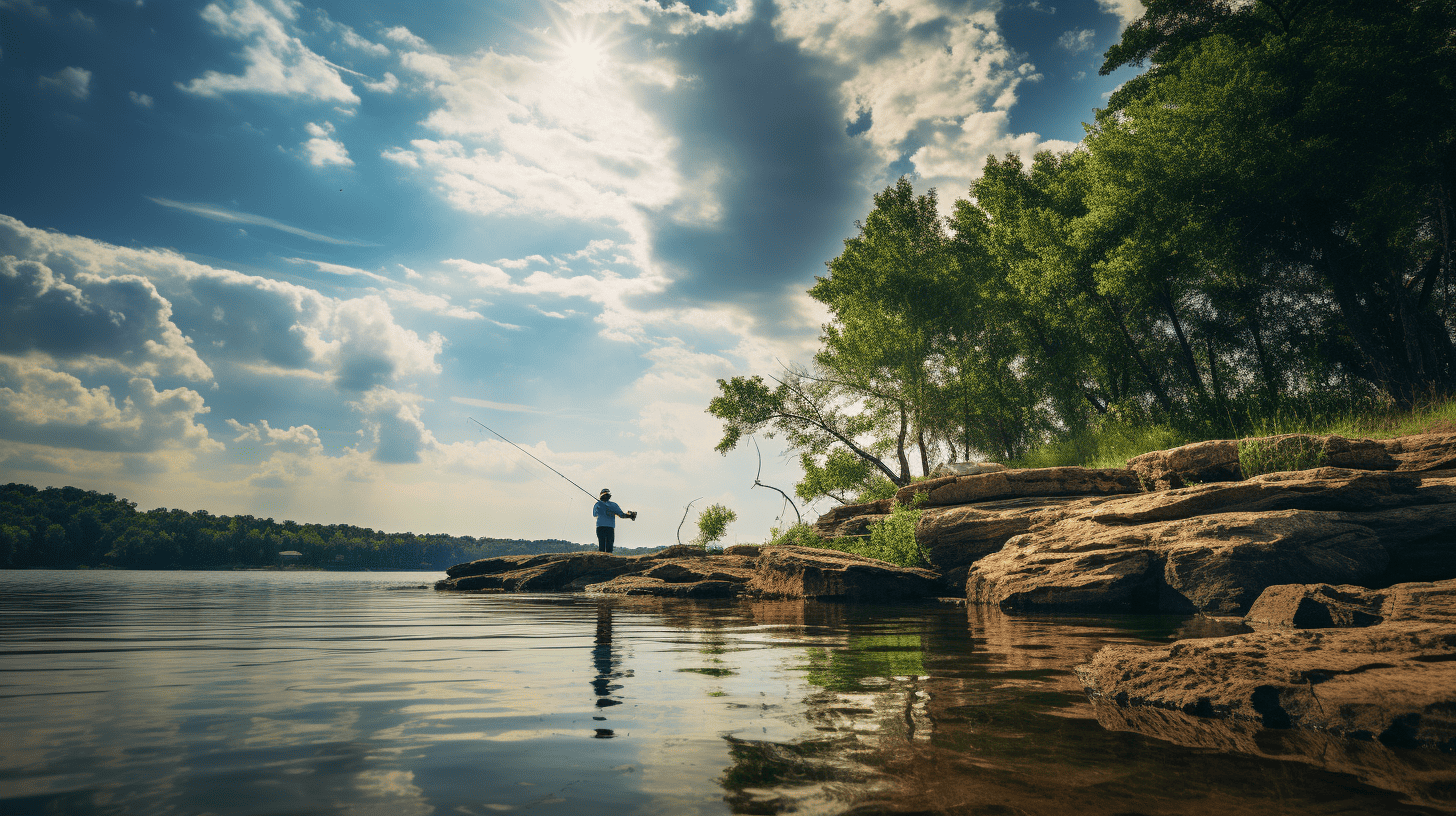Are you a freshwater fishing enthusiast who just can’t seem to reel in the big catch? Don’t worry, you’re not alone; I’ve been right there with you. Through trial and error, endless reading of fishing guides, and chatting with seasoned fishing pros, I’ve gathered 11 expert tips that can really turn your luck around.
Want to up your game? Let’s dive in together and transform your skills from amateur to pro, one helpful tip at a time!
Key Takeaways
- In – shore fishing and targeting different species can help promote growth in freshwater fishing skills.
- Paying attention to factors like the sun, moon, weather, and water temperature can improve your chances of catching bigger fish.
- Using sharp hooks and practicing catch-and-release are important for successful freshwater fishing.
11 Top Tips for Freshwater Fishing Growth
First, try in-shore fishing. This is one of the top ways for freshwater fishing growth. You could also target giant Sturgeon in the Great Lakes. These tips can make your trips more fun and interesting.
It’s good to fish for more than just Bass too. Try other types too!
Second, note down when you go fishing every time–the sun’s place, the moon, and how the weather is that day. All these factors can play a part in helping you catch bigger and better fish each time! Also keep an eye on the water temperature as it affects how fishes behave.
Thirdly, sharp hooks are key tools to have with you while fishing. They help get better results by ensuring a strong grip on your catch along with sturdy lines which don’t break easily during catches.
Beginner-Friendly Tips
Start with Panfish, as they are smaller and more abundant in freshwater lakes and rivers. Use lures instead of live bait to attract fish more effectively. Focus on the basics of casting, reeling, and setting the hook for a successful catch.
Build good habits like practicing catch and release to contribute to conservation efforts.
Start with Panfish
Starting with panfish is a great tip for new anglers. Panfish are small and easy to catch. Some of the types you can find in freshwater are black crappie, white perch, yellow perch, bluegill, and rock bass.
I like to look for spots where the water is muddy or stained. These places hold lots of panfish because they offer good cover. You might be surprised at how many fish you can catch from just one good spot!
Using lures makes catching these little fighters fun! Dark-colored baits work best in springtime when the water tends to be murkier. On clear days with bright sun, I switch to lighter colored lures designed specifically for each species.
Catching panfish will help build your fishing skills early on. So get out there and start reeling them in!
Use Lures
Lures help catch fish. Start by casting from a local pond bank. Small crankbaits, plastics, and marabou jigs are good for beginners. They make the bait look like small fish. Also, try suspending minnows with bobbers for success.
Fish love woody cover spots so cast there to up your odds of catching them! You’ll see that using lures can boost your freshwater fishing skills fast!
Focus on the Basics
To become a better fisherman, it’s important to focus on the basics. By understanding the fundamental principles and core concepts of fishing, you can develop essential techniques and build foundational skills.
Start by mastering the basic principles of casting, reeling, and setting hooks. Learn about different fishing knots and how to tie them properly. Familiarize yourself with the types of fish in your area and their preferred habitats.
Knowing these key strategies will help you make more informed decisions when it comes to bait selection and where to cast your line. So remember, when it comes to improving your fishing skills, focusing on the basics is essential for growth as an angler.
Build Good Habits
Developing good habits is essential for improving our skills and increasing our success rates in fishing. By practicing these beginner-friendly tips, we can enhance our abilities and catch more fish. Here are some novice-friendly strategies to help us become better fishermen:
- Start with catching panfish: These smaller fish are easier to catch and can help us gain confidence in our fishing abilities.
- Use lures: Experiment with different types of lures to attract a variety of fish species.
- Focus on the basics: Learn the basic principles of fishing, such as casting techniques and how to properly reel in a fish.
- Develop positive behaviors: Stick to ethical fishing practices, like catch-and-release, to preserve the health of the fish population.
Tips for Intermediate Anglers
Get the right gear, including a baitcasting reel and quality fishing rods, to enhance your chances of success on the water.
Get the Right Gear
Selecting the right gear is crucial for successful freshwater fishing. I recommend using bait-casters, as they are great for casting accuracy and control. When it comes to tackle selection, consider the type of fish you’re targeting and match your gear accordingly.
It’s important to have the appropriate fishing equipment to increase your chances of a successful catch. If you’re unsure about what gear to get, there are plenty of gear reviews available online that can help guide your decision.
Remember, having the right gear can make all the difference in your fishing experience!
Learn to Understand Underwater Geography
Understanding underwater geography is essential for any angler looking to improve their fishing skills. By studying the topography and bathymetry of a fishing area, anglers can identify potential fishing hotspots and increase their chances of success.
Underwater geography includes factors such as depth, structure, vegetation, and submerged features of a body of water. This knowledge helps anglers choose the right techniques and lures based on the specific conditions they encounter.
To learn about underwater geography, anglers can study maps, charts, and use fish finders or other electronic devices that provide information about seafloor morphology and marine habitats.
Perfecting Presentation
Perfecting presentation is a crucial skill for intermediate anglers like me who want to enhance their fishing skills and improve their freshwater fishing techniques. It’s all about making our bait or lure look as appealing as possible to the fish.
To do this, I focus on refining my technique and finding the right speed for retrieving my bait or lure. For example, during early spring fishing for largemouth bass, I start with slower bait presentation and then gradually increase the speed if the bass are not biting.
Another important aspect of perfecting presentation is selecting the appropriate rigging techniques and using effective fishing knots for different scenarios. By mastering these skills, I have noticed an increase in my success rate and overall enjoyment of fishing.

Don’t Stop Trying New Things
When it comes to fishing, it’s important to keep trying new things. As an intermediate angler, this tip can really help improve your fishing game. Don’t be afraid to experiment with different techniques, lures, and spots.
You never know what might work best for you on any given day.
Try using different types of lures and bait to see what the fish are biting on. Explore new fishing spots and learn about the underwater geography in those areas. By understanding where the fish might be hiding, you’ll have a better chance of catching them.
Perfecting presentation is also key. Keep practicing casting techniques and try out different fishing knots to ensure your line is secure. And most importantly, don’t get discouraged if something doesn’t work right away.
Keep trying new things until you find what works best for you as an angler.
Fishing Tips for Seasoned Pros
For seasoned pros, here are some advanced tips to take your freshwater fishing to the next level.
Sign Up for Tournaments
I love participating in fishing tournaments! It’s a great way to challenge yourself and meet other fishing enthusiasts. Whether you’re a seasoned pro or just starting out, signing up for tournaments can be an exciting experience.
Not only do you get to test your skills against other anglers, but you also have the chance to win prizes and recognition. Tournaments offer different divisions based on skill level, so even if you’re new to fishing, there are opportunities for you to compete.
Plus, some tournaments even have special youth sizes available to encourage young anglers to participate. So why not give it a try? Sign up for a tournament and see how far your fishing skills can take you!
Adapt to Poor Fishing Conditions
When faced with poor fishing conditions, seasoned pros like myself know how to adapt and still have a successful day on the water. One important tip is to change your target fish species.
If the fish you were originally targeting are not active or biting, try switching to a different species that may be more active in those conditions. It’s also helpful to adjust your fishing techniques and presentations.
Experiment with different lures, bait, and retrieval speeds until you find what works best for the current conditions. Lastly, consider exploring new fishing spots or trying different areas of the water body you’re fishing in order to increase your chances of success.

Change Your Target
Changing your target fish species can be a refreshing and exciting way to keep your passion for fishing alive. As an experienced angler, you may find that the growth in your skill level is slower compared to when you first started out.
By exploring different fish species, you can learn new techniques and strategies that will challenge and invigorate you. Additionally, changing your target allows you to adapt to different water conditions and explore new fishing locations.
It’s important to consider factors like the target fish species, water conditions, and personal preferences when selecting appropriate gear for each fishing adventure. Remember, trying something new can lead to amazing fishing experiences!
Optimize Your Fishing Times
Finding the right time to go fishing can greatly increase your chances of success. Here are some tips to optimize your fishing times:
- Pay attention to fish behavior during different times of the day.
- Fish are often more active and feeding in the early morning or late evening.
- Consider the weather conditions, as fish may be more active before a storm.
- Research popular fishing destinations and find out when they are most productive.
- Take advantage of angler rewards programs that offer incentives for catching certain species.
- Plan your trips around factors that influence fishing success, such as moon phases and tide schedules.
Choose the Right Equipment
Choosing the right equipment is important for a successful freshwater fishing trip. Here are some tips:
- Select the proper gear, such as rods, reels, and tackle, based on the type of fish you’re targeting.
- Familiarize yourself with local fishing rules and regulations to ensure you have the right equipment and follow any size or quantity restrictions.
- Understand fish tendencies and habits, so you know what kind of equipment will work best for different species.
- Ensure safety and comfort while fishing by wearing appropriate clothing like a life jacket or sunscreen.
- Match your fishing line strength with the type of fishing you’ll be doing. Lighter lines work better for smaller fish, while heavier lines are needed for larger fish.
- Choose suitable equipment specifically designed for freshwater fishing to increase your chances of success.
- Invest in the right gear that fits your budget and skill level to make your fishing experience more enjoyable.
Understand Fish Behaviors and Habits
Understanding fish behaviors and habits is crucial for freshwater fishing success. By learning about their natural habits, preferred habitats, and feeding patterns, you can improve your angling experiences.
Fish have different behaviors depending on the time of day, water temperature, and weather conditions. For example, some species are more active during dawn and dusk when they feed the most.
Knowing this information can help you plan your fishing trips accordingly.
Fish also have specific preferences when it comes to their habitat. Some species prefer shallow areas with lots of vegetation, while others thrive in deeper waters near underwater structures like rocks or fallen trees.
By understanding these habitat preferences, you can target the right areas when casting your line.
In addition to knowing where fish like to hang out, it’s important to understand their feeding patterns. Different fish species eat different types of bait and lures at various times of the year.
Being aware of what they’re feeding on can increase your chances of success in catching them.
Overall, by familiarizing yourself with fish behaviors and habits, you’ll be able to make more informed decisions while fishing. This knowledge will help you adapt your techniques based on changing conditions and increase your chances of reeling in that big catch!
Stay Safe and Comfortable on the Water
Personal safety and comfort are essential when freshwater fishing. Here are some tips to help you stay safe and comfortable on the water:
- Wear a life jacket or personal flotation device at all times.
- Make sure to bring sunscreen and apply it regularly to protect your skin from harmful UV rays.
- Stay hydrated by drinking plenty of water, especially on hot days.
- Dress appropriately for the weather and wear layers that can be added or removed as needed.
- Be aware of potential hazards such as rocks, submerged logs, or strong currents.
- Avoid fishing in areas with electrical lines or power cables overhead.
- Use insect repellent to prevent mosquito bites and other insect-related discomforts.
- Bring a basic first aid kit in case of any minor injuries while fishing.
- Always let someone know your fishing plans, including where you’ll be fishing and when you plan to return.
Use the Appropriate Bait and Lures
To catch more fish, it’s important to use the right bait and lures. Here are some tips to help you choose the best ones:
- Surface fishing is great for targeting largemouth bass, especially when the water is warm (around 70 degrees Fahrenheit or higher). So, make sure to have surface lures like topwater baits in your tackle box.
- If you’re aiming for trophy bass, using live bait can be highly effective. Try using live minnows, shiners, or worms to attract those big ones.
- When it comes to artificial bait for largemouth bass, there are plenty of options. Jigs, plugs, spoons, spinners, and plastic worms come in different shapes, sizes, and colors. Experiment with different types to see what works best for you.
- To use bait effectively, make sure to match the size and color of your bait with what the fish are feeding on in that specific area and time of year.
Practice Proper Fish Handling and Releasing
Properly handling and releasing fish is important for their survival. Here are some tips:
- Hold the fish gently and wet your hands before touching it.
- Use needle – nose pliers or dehooking tools to remove the hook quickly and carefully.
- Keep the fish in the water as much as possible during the process.
- If you must handle the fish, use a wet towel or gloves to protect yourself from sharp fins or teeth.
- Avoid squeezing the fish too tightly, as it can cause injury.
- If the fish is deeply hooked or bleeding, consider cutting the line close to the hook instead of removing it.
- When releasing, hold the fish upright in calm water and let it swim away on its own.
- If necessary, gently revive the fish by moving it back and forth in the water until it swims away strongly.
Join a Fishing Community
Joining a fishing community is a great way to improve your fishing skills and connect with fellow enthusiasts. By joining clubs, groups, or forums dedicated to fishing, you can learn new tips and techniques from experienced anglers.
These communities provide opportunities to share experiences, ask questions, and get advice on various topics related to freshwater fishing.
Being part of a fishing community can also help you improve your casting accuracy and distance. You can participate in casting competitions or attend meetups where you can learn from others who have mastered the art of casting.
Sharing knowledge with each other will ultimately enhance your overall fishing experience.
So whether it’s attending local fishing gatherings or becoming an active member of online networks, joining a fishing community will not only expand your knowledge but also create lasting connections with like-minded individuals who share the same passion for angling as you do.
Conclusion on Freshwater Fishing Tips
In conclusion, these 11 top tips for freshwater fishing growth will help beginners, intermediate anglers, and seasoned pros improve their skills and increase their success on the water.
From using the right equipment to understanding fish behaviors and practicing proper fish handling, implementing these tips will enhance your fishing experiences. So grab your gear, head out to your favorite fishing spot, and put these tips into action for a more rewarding and fruitful day of freshwater fishing!
FAQs on Freshwater Fishing Tips
1. What types of fish can I catch in freshwater?
In freshwater, you can catch various types of fish such as bass, trout, catfish, perch, and sunfish.
2. What is the best time to go freshwater fishing?
The best time to go freshwater fishing is early morning or late afternoon when fish are more active and feeding.
3. Do I need a fishing license for freshwater fishing?
Yes, in most places you need a fishing license to legally fish in freshwater. Check your local regulations for specific requirements.
4. What equipment do I need for freshwater fishing?
For freshwater fishing, you will typically need a rod and reel combo with appropriate line strength, hooks, baits or lures depending on the type of fish you want to catch.
5. How can I improve my chances of catching fish while freshwater fishing?
To improve your chances of catching fish while freshwater fishing, try using different bait or lures, experiment with different depths and locations in the water body, and learn about the habits and behavior of the specific fish species you are targeting.





Leave a Reply